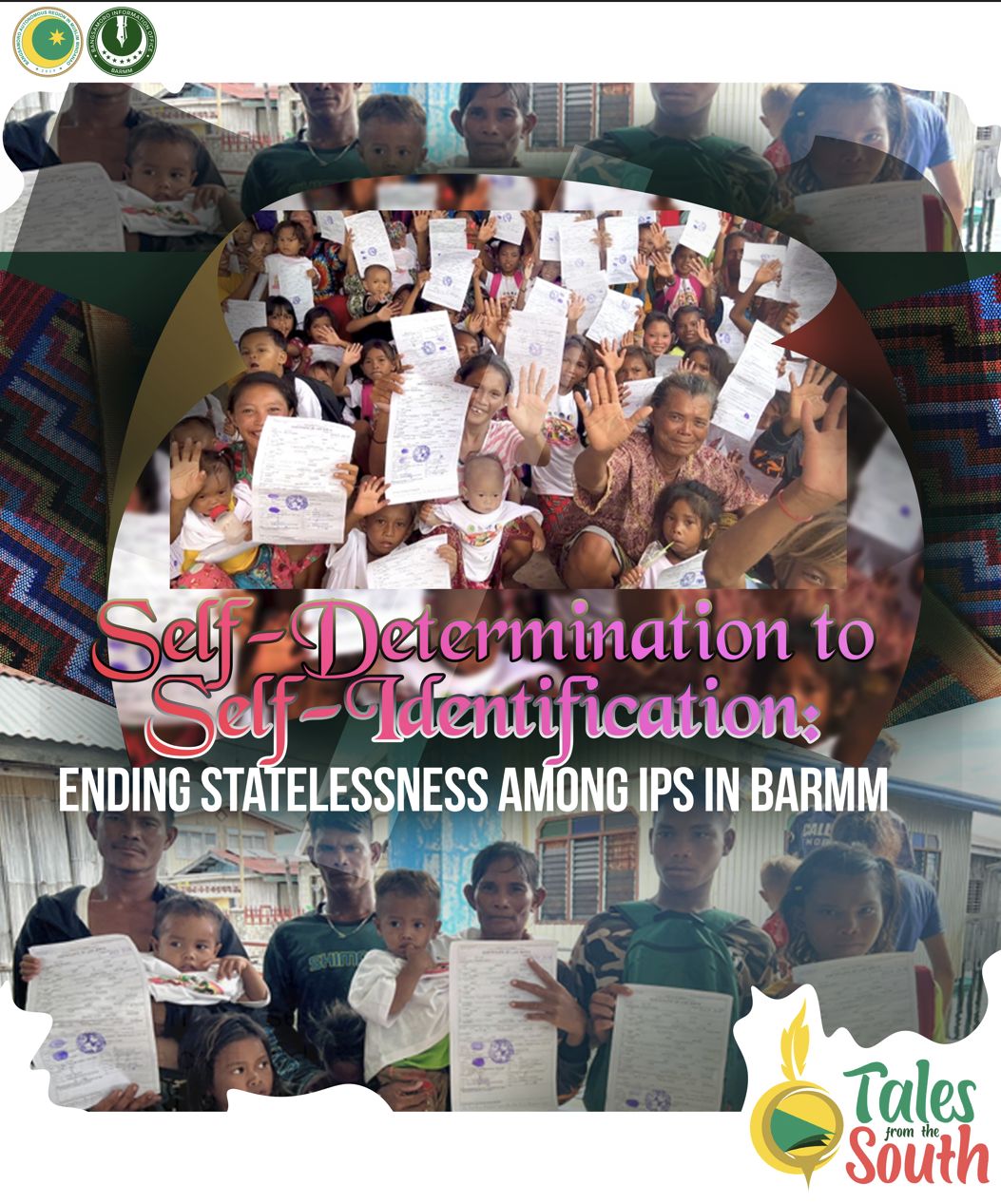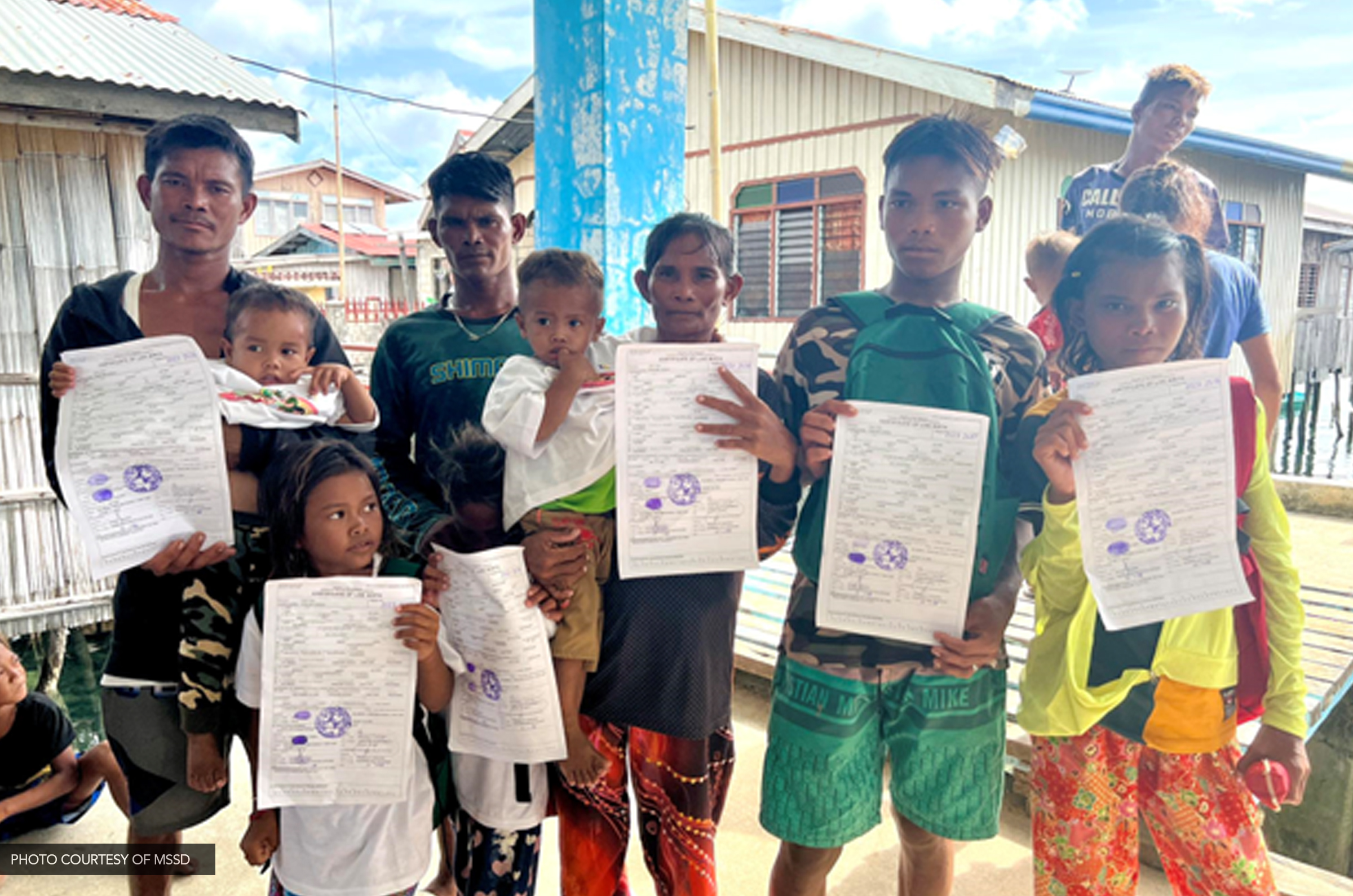
From time immemorial, the Indigenous Peoples (IPs) of the Bangsamoro Autonomous Region in Muslim Mindanao (BARMM) have played a crucial role in the region’s quest for self-determination. As the entire region moves closer to lasting sustainable development, the Bangsamoro Government is actively addressing the issue of statelessness among its IPs, particularly the Sama communities.
In 2022, the Ministry of Social Services and Development (MSSD), with the help of its development partners such as the United Nations High Commissioner for Refugees (UNHCR), United Nations Children’s Fund (UNICEF), and the Philippine Statistics Authority (PSA), launched the Free Birth Registration Project. This initiative aims to rectify the prevalent issue of non-birth registration among IPs resulting to their limited access to essential programs and services.

The beneficiaries of Free Birth Registration holding their birth certificates during MSSD’s outreach program held last November 2023 at Panglima Sugala, Tawi-Tawi (Photo courtesy of MSSD)
This February 2024, the country commemorates the 34th Civil Registration Month Celebration. With the theme “CRVS: The Future of Seamless Services,” the Bangsamoro Government aims to expand the Free Birth Registration initiative. It remains committed to implementing this program to ensure equal opportunities for all constituents in accessing government programs and services.
A birth certificate is a fundamental right for every child. It serves as a crucial legal document necessary for availing government programs and services. Unregistered births often result in exclusion from essential interventions, including educational assistance, healthcare, and social services like the Pantawid Pamilyang Pilipino Program (4Ps).
The 2020 Census of Population and Housing revealed that BARMM has the lowest birth registration rate among all regions, with approximately 1.10 million individuals yet to register their births. Most IP communities in the region, belonging to the poorest populations in the country, face barriers such as prioritizing food over spending their meager income on transportation and birth registration fees.
To boost birth registration rates, MSSD, through its Child and Youth Welfare Program (CYWP), is covering all fees required for issuing Security Paper (SecPa) for IP children aged 0 to 12, the primary beneficiaries of this registration drive.
The initiative’s pilot phase in 2022 specifically targeted the municipalities of Patikul and Parang in Sulu, Hadji Mohammad Ajul in Basilan, and Tandubas in Tawi-Tawi. Since its inception, the program has registered and provided birth certificates to a total of 3,337 IP beneficiaries across the region. MSSD-CYWP focal person Arbainie Guiabar stated that there are plans to expand this initiative this year with the continuous support of its development partners.
“This year [2024], MSSD, with the support of UNHCR, UNICEF, and the Government of Japan, aims to register 7,500 indigenous children from 25 target municipalities across the region”, said Guiabar.
The timing of this initiative aligns with the recent launch of MSSD’s Layag Badjao Program, catering to the indigent Sama communities in the provinces of Basilan, Sulu, and Tawi-Tawi.
In 2023, a total of 2,000 households were enrolled in the program and this year, MSSD aims to add 3,000 more. With their birth certificates in place, the beneficiaries can now apply to be included in the array of programs of BARMM’s ministries and offices that aim to uplift their well-being.
Ismilita Mawaldati, a mother of six from the Sama-Bajau community in Panglima Sugala, Tawi-Tawi, shared that, like many families in their town, poverty made it difficult for them to acquire birth certificates for their children. Their weekly income of 800-900 pesos from seaweed farming and fishing barely covers their daily expenses.

Ismilita Mawaldati, along with her spouse and their six children during the National Children’s Month 2023 celebration in Panglima Sugala, Tawi-Tawi (Photo courtesy of MSSD)
“Anim ang anak ko pero lahat sila ay walang birth certificate dahil wala kaming pambayad. Nagpapasalamat kami sa BARMM dahil sa wakas, natulungan kaming makakuha ng birth certificates para sa mga anak namin,” said Ismilita.
[I have six children but none of them have a birth certificate because we couldn’t afford it. We are grateful to BARMM because finally, they helped us obtain birth certificates for our children.]
Her family received their birth certificates last November during the National Children’s Month Celebration in their town organized by MSSD.
According to Joy Ann Sajiran – Kamlian, Panglima Sugala’s municipal social welfare officer, Ismilita’s household is also now officially one of the beneficiaries they monitor under the Layag Bajau program.
The success of this initiative lies not only in the registration of births but also in the comprehensive support extended to these marginalized communities.
The steps made by the Bangsamoro Government and its development partners aim to pave the way for a brighter, more inclusive future for the IPs in the region, and it all starts with ending statelessness among these communities. (Norjana Malawi/BIO)







